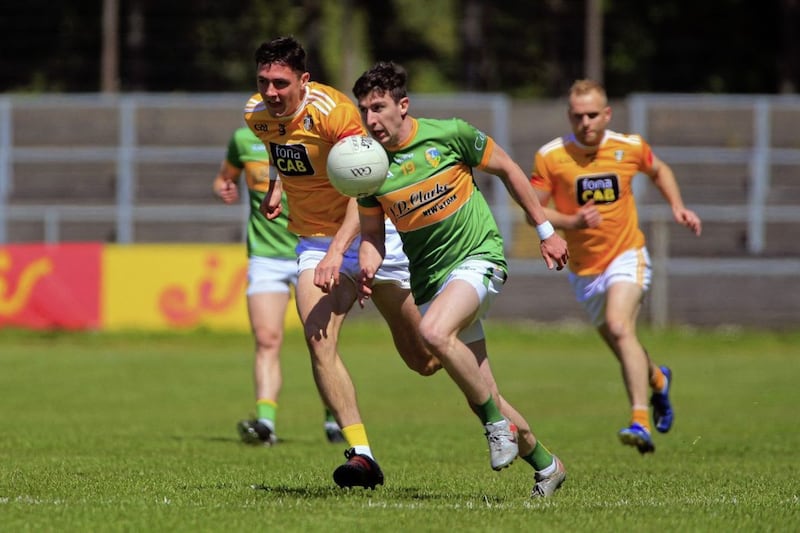WAS it perhaps a coincidence that Andy Moran won the prestigious 2017 Footballer of the Year award in the twilight of his career?
There is no doubt that running his own business – a gym – allowed him to concentrate solely on inter-county football, in particular recovery and maintaining the levels of fitness required for the game, especially given his age.
Don’t discount the perspective that having a family can give you. Moran has two young children and any player with similar circumstances can relate to the challenges this can bring within any relationship.
When you have children, though, there is certainly a new sense of perspective which develops.
A defeat still hurts, don’t get me wrong. At times you still feel totally consumed by it all. However, the innocence of a smiling child is capable of very quickly renewing your spirit.
It is not about ‘me’ any longer.
Through life experience, it should mean that sport now takes its place within a new outlook on life.
For me, this has taken time.
Too long, some would say, but better late than never.
I still take the game extremely seriously, but for now it’s about staying on the field, contributing and helping where I can.
It’s hard to adjust yourself mentally to this new way of thinking and approach. You cannot just flick a switch.
When I see younger players quit the game or perhaps give up – an increasing problem at all levels of football – I can only assume that the shift in perspective has occurred at a much earlier age than it did for me.
Having to prove yourself day in, day out, week in, week out, can be one of the most debilitating aspects of sport if you allow the sport to consume you.
If you are trying to prove things to yourself, then one should ask why? Alternatively, do you have to prove yourself to family, friends or supporters?
In order to make it in inter-county football I felt I had to give up everything. And I did just that.
Family, relationships, friends and work all became mere facilitators of football.
Making the way at county level came much easier to some players because of their ‘name’.
An underage record still counts for something in Gaelic football and I have found that those with superstar status at a young age can get a significant boost when it comes to minor and U21 football (at that time) participation.
I always thought that I had to work harder than those lads, having not made any underage minor teams, in part due to my size at the time.
So I became obsessed with physically developing and I was lucky that I had a growth spurt in my late teens.
However, I never gave that much thought to the mental aspects of the game. I concentrated solely on the physical attributes, and, when they were in a good place, the mental side was never really an issue.
When injuries prevented me from being where I wanted to be physically in the latter part of my inter-county career, I became mentally constrained in dealing with the inability to compete and play at a level I expected of myself. Anger, anxiety, fear, you name it.
At that point, football loses all sense of perspective. It doesn’t become enjoyable any more.
In the absence of any meaningful outlet, a player can become totally consumed by the game.
If an individual’s inter-county career is based around football or indeed is wrapped up in county participation, it can be extremely difficult to deal with sudden adjustments like injury.
Andy Moran experienced two cruciate knee operations and a broken leg in between in the last six years. It would probably be safe to say that the fact that he could direct his attention towards a partner and/or children and a career most definitely helped to put football in its place.
We are all guilty at times of taking life, in particular sport, much too seriously.
Twitter has become judge, jury and executioner. These are new times and society is changing faster than anyone would expect.
The challenges younger generations are facing and will face in the future scare me.
Indeed, when you see the statistics pointing toward increased levels of anxiety and depression among people, it is perhaps a wake-up call in telling us that pressure within society can have a huge impact on our parishes and communities.
For much younger people without the experience of a young family and having children to get dressed and out to school, I can understand that a frustrating football career could have a huge mental impact on their day-to-day lives. The pressure one can feel from the local club, community, relatives, friends and family can leave it hard NOT to commit, yet fuel a dread at the same time should they decide to go.
Those ‘lazy’ individuals, deemed to have ‘unutilised talent’ are pressurised even more and ostracised in certain cases.
I am probably sounding hypocritical in terms of commitment, as I have never understood why you would not want to play and contribute to any sport, especially if you have talent.
It is a worthwhile instrument within society and helps us to communicate better, develop skills and create lasting friendships. It also helps bond communities When you take it for what it is, Gaelic football is a beautiful game.
When you put it into perspective, though, it is not life and death.
Yes, the abuse can be hard to listen to and indeed it crosses the lines, but then again without fans, we would have no game either.
I recall meeting a supporter after a game one evening.
Needless to say, we were beaten and my form wasn’t the best.
He started to tell me where the manager went wrong and then where I was going wrong and almost dissected every aspect of each ball I received that night.
I had two options.
The preferred first option: I hit this fella a slap on the mouth.
The second option (which I took):
I asked him for a background on his football playing credentials.
“What level did you play?’”
“Ahh ahh, don’t be like that,” he said.
I kept asking.
Finally, I got an answer.
“Thirds” he said.
“That’s enough for me,” I said.
Moral of the story.
Football is all about perspective, even criticism. It’s important
to not take it too seriously.






